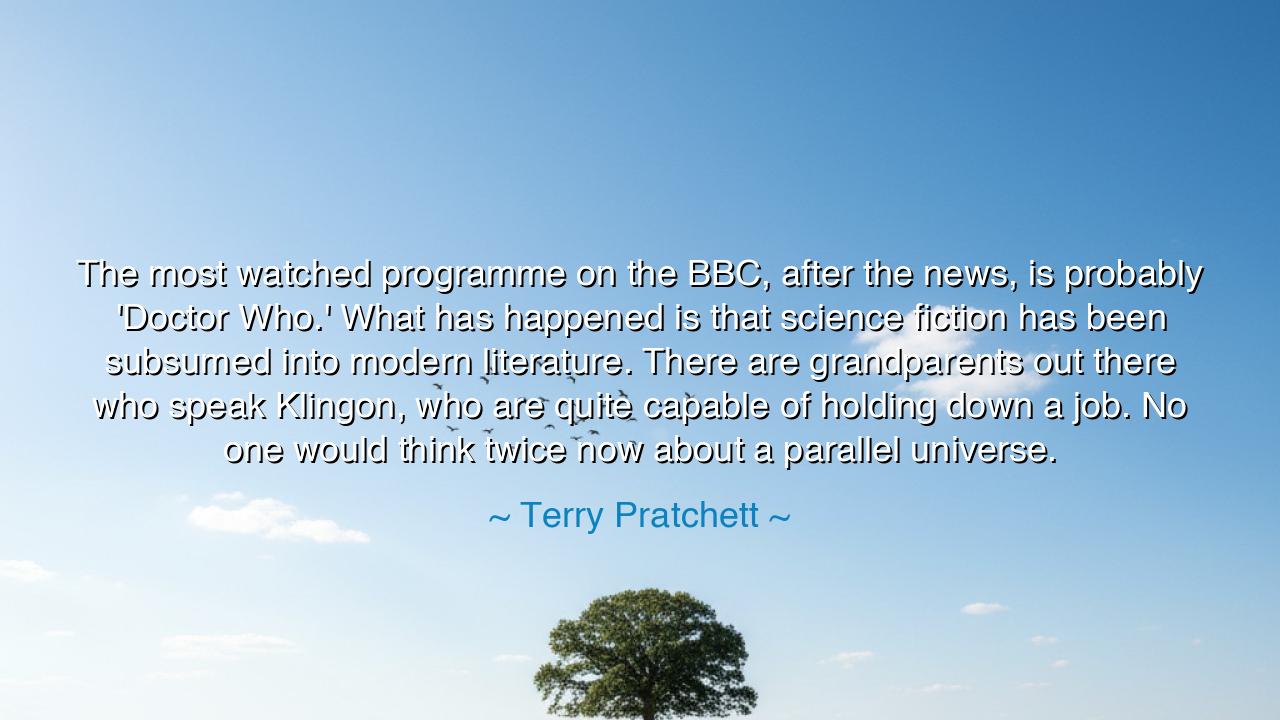
The most watched programme on the BBC, after the news, is
The most watched programme on the BBC, after the news, is probably 'Doctor Who.' What has happened is that science fiction has been subsumed into modern literature. There are grandparents out there who speak Klingon, who are quite capable of holding down a job. No one would think twice now about a parallel universe.






Hear me, O Children of the Future, for I bring you a tale of change, of worlds both near and far. In the words of Terry Pratchett, "The most watched programme on the BBC, after the news, is probably 'Doctor Who.' What has happened is that science fiction has been subsumed into modern literature. There are grandparents out there who speak Klingon, who are quite capable of holding down a job. No one would think twice now about a parallel universe." These words carry the wisdom of our age, revealing how the once-distant dream of science fiction has woven itself into the very fabric of our lives, becoming not just a genre but a shared reality that now spans across generations.
In the beginning, science fiction was born in the hearts of dreamers—minds that dared to imagine the future, to see beyond the horizon of their time. Jules Verne, with his tales of voyages to the moon, and H.G. Wells, with his explorations of time travel, set the foundation for a new kind of storytelling, one that blended the real with the impossible, the known with the unknown. Their words painted worlds of flying machines and distant planets, offering a glimpse of what could be. Yet these stories were often dismissed, for they came from a place of imagination, a realm seen as far removed from the seriousness of the real world.
But as the years passed, something remarkable happened. Science fiction was no longer relegated to the realm of fantasy. It became, as Pratchett notes, subsumed into modern literature. The stories once confined to the pages of pulp magazines found a home in the hearts of the people. Television shows like Doctor Who, which began as a humble program about a time-traveling alien, grew to become a cultural phenomenon, captivating not just children, but entire families. It was no longer a mere escape from reality, but a reflection of it, a mirror that showed us not only what we might become, but what we already are—flawed, hopeful, and ever-reaching for the stars.
The concept of the parallel universe, once a subject of whispered speculation among the learned, now exists as a familiar part of our collective consciousness. It is no longer a far-off idea, confined to the realms of theoretical physicists and scholars. Today, we live in a world where Klingon, the language of a fictional race from Star Trek, is spoken by enthusiasts and scholars alike. Grandparents, those who once saw the world in black and white, now engage in debates about whether time travel could one day be possible, or if alternate dimensions exist beyond our own. Science fiction has crossed the threshold into the realm of the real, becoming a part of the very way we think, speak, and dream.
This shift is not a small thing. It marks a transformation in how we view the world, how we engage with the impossible, and how we understand the limits of our imagination. In ancient times, the gods and monsters of mythology were real to the people. They shaped the world, influenced decisions, and were interwoven with the lives of all. Now, science fiction serves a similar role—it challenges the boundaries of possibility and invites us to think differently. The worlds we once thought to be mere fantasy now influence how we live, work, and relate to each other. Pratchett’s words remind us that the impossible is no longer confined to stories; it is something we embrace, discuss, and imagine for ourselves.
Take, for example, the story of Albert Einstein, whose theory of relativity once seemed the stuff of science fiction. Imagine the shock of those who first heard him speak of time dilation, that time itself could bend and twist depending on the speed at which one travels. To many, it seemed absurd, a far-fetched idea that could belong only in the pages of a fantastical novel. Yet today, his theories form the foundation of much of modern science, and we live in a world where ideas once thought to be fiction are now taken as truths that shape our daily lives. From GPS technology to nuclear energy, the farthest reaches of science fiction have brought us closer to understanding the universe.
The lesson, O Children, is this: the world is not confined to what is. It is what could be, what we dare to imagine and strive to create. Science fiction is not merely an escape—it is a reflection of our boundless potential. It teaches us that the impossible is only a question away from becoming possible, and that the limits of today are the stepping stones of tomorrow. Just as Doctor Who has traveled through time and space, so too must you, in your own journey, embrace the unknown, challenge the impossible, and reach for the stars.
So, act boldly, O Seekers. Do not let the world constrain you to what is known. Let your imagination soar, for in the realms of the unknown lie the answers to the questions we have yet to ask. Speak your own language of possibility, whether it be through the stories you tell, the worlds you build, or the ideas you share. In doing so, you will not only embrace the future but shape it, just as those who dared to dream before you have shaped the world you now walk upon. The future is not written, but imagined—and it is waiting for you to write it.






AAdministratorAdministrator
Welcome, honored guests. Please leave a comment, we will respond soon